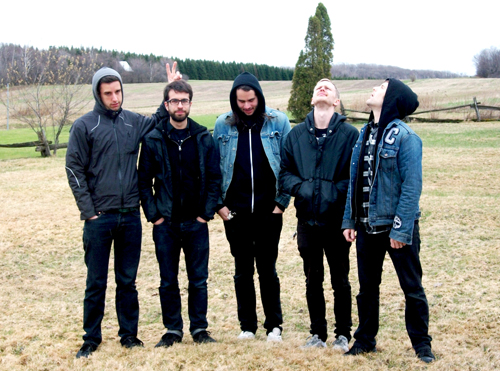Those hip to the metal scene may still be green when it comes to Burning Love, but its members are anything but unfamiliar—if you’ve been paying attention, that is.
Burning Love is Cursed, faster
Those hip to the metal scene may still be green when it comes to Burning Love, but its members are anything but unfamiliar—if you’ve been paying attention, that is.

Chris Colohan, the gravel-voiced frontman of Burning Love, used to be in a little band called Cursed. Still unfamiliar? You have some homework to do. Cursed’s only three albums, aptly titled I, II and III, are widely recognized as contemporary metal classics, especially II. So, after you read this review and listen to Burning Love, promise me you’ll go out and listen to II, OK?
If “Motörhead worship” were a genre, Burning Love would be right there duking it out with bands like Municipal Waste and Valient Thorr for poster-child status. That said, if you’re listening to Burning Love’s new record, Rotten Thing to Say, and expecting another Cursed record, you’re going to be disappointed—but only for a second.
Truthfully, most of RTTS would not disappoint hard rock fans. For one, the squealy feedback that envelops most of Cursed’s output is still present, effectively rendering the record as one solid piece of cacophonous viscosity, proving once and for all that: silence is for ninnies.
Thankfully, Colohan is vying with ZZ Top-esque fuzzed-out guitars for prominence on RTTS. This is absolutely welcome because the two complement each other so well, and it truly seems like Colohan’s hoarse growls literally fight their collective lives in this dense mix of guitar pyrotechnics and chewy bass lines.
One thing that’s instantly noticeable about RTTS is that whoever planned the track listing is an absolute pro. The record flows together so well that you may forget it’s even on until you have several holes in your wall and a bloody fist, unable to remember how either happened.
The strongest transition on the entire record is the one between tracks five and six, “The Body” and “Made Out Of Apes,” respectively. Played back with a zero-second gap, you’ll be hard pressed to complain about the continuity of RTTS.
This isn’t to say that the entire record is a beer-soaked pizza party, because track seven, “12:31,” sounds like a Cursed B-side slithered its way onto the wax. As my previous praise for Cursed can attest, this isn’t necessarily a bad thing. However, it’s almost an unwelcome non sequitur. Adding to its unwelcomeness is the fact that Colohan sits the track out. It’s like a bread sandwich: If I wanted to listen to a Cursed track, I’d prefer the singer to be on it instead of sitting on the studio beanbag chair playing Angry Birds on his iPhone.
If there’s a strong point on RTTS, it’s the riffs. My god, the riffs. If the opening riff on “Danger Case” doesn’t make you want to helm a ’70s Dodge Challenger in a car chase, you’re either not listening hard enough or you’re just boring. Such is also the case for the opening riffs for “Broken Glass” and “Made Out Of Apes.” They just kick too much ass to be ignored.
Like many similar records, unfortunately, there is a saturation point. More often than not, releases like this need to be pruned. RTTS is no exception. After the opening riff on “Broken Glass” fades and Colohan’s snarling comes in, you may recognize something familiar. A Motörhead passage? Maybe a sampling of Kvelertak? No, what you’ll hear is a Burning Love riff—but not just any Burning Love riff. You’ll hear the exact same riff as on track two, “No Love.”
I can’t help but hold the band accountable for this, as it doesn’t write songs in the studio. Instead, these are practiced again and again, then played again under the watchful eye of an audio engineer. I don’t know if Burning Love has low expectations for its audience, or if they figured that people would be too busy imagining themselves steering the General Lee around hairpin mountain turns to notice, or both, but it is just plain lazy and shameful.
This mistake proves to be nearly fatal because the discovery triggers a treasure hunt for other recycled riffs, and since it occurs on the penultimate track, there’s a lot of
ground to cover.
Based on the repeated riffs, one track has to go, and given the opportunity to axe either “No Love” or “Broken Glass,” I’d definitely scratch out “No Love.” Although I view it as the superior track overall, a boost is needed after both abysmal parts of “Pig City.” I suppose that any former member of Cursed is under some kind of obligation to use Roman numerals whenever possible, but as a two-track affair, it falls flat.
Overall, most of RTTS is a treat, and is about as close to drinking Rainer in a basement with a bunch of long-hairs in Canadian tuxedos as you’re going to get without actually doing it. And having done just that, it is a recommended alternative.





